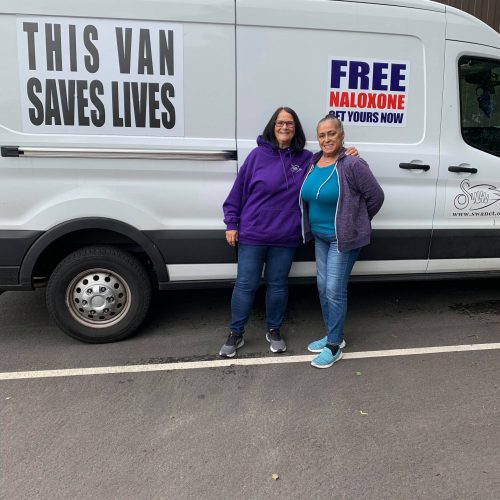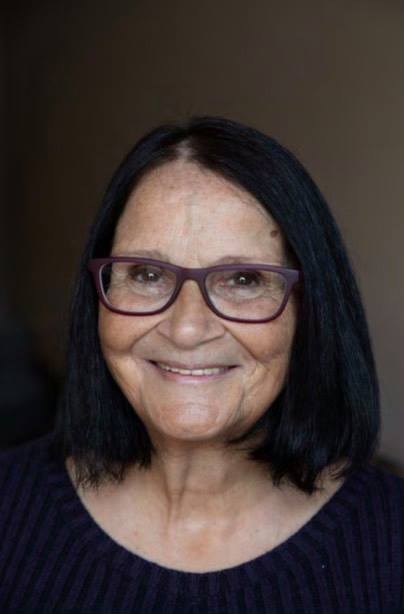
"Support, Not Stigma": An Interview with Beatrice Codianni, Founder and Executive Director of Sex Workers and Allies Network (SWAN), Inspiration for "Esposito" in "Orange is the New Black" — Part 1 of 4

**This interview has been edited for length and content.
Beatrice Codianni is the Executive Director and Founder of The Sex Workers and Allies Network (SWAN), a renowned harm reduction organization based New Haven, Connecticut. SWAN stands for decriminalization of sex work, abolition of the unjust criminal system, and dignity for all. Beatrice is a longtime community activist who was sentenced to 17 years in the Federal Correctional Institution, Danbury, serving time with Piper Kerman, author of the book, “Orange is the New Black: My Year in a Women’s Prison,” that inspired the popular Netflix series of the same name (Codianni’s character was referred to as “Esposito”). As a high ranking member of the Latin Kings, she used her community activism skills to fight for jobs, education and mental health and substance abuse treatment for disenfranchised youths. Beatrice is now the Managing Editor of Reentry Central, a nationally recognized website on reentry and criminal justice reform issues. She is also co-founder of the groups The Real Women of Orange is the New Black, the National Council for Incarcerated and Formerly Incarcerated Women and Girls, and the Women’s Resettlement Working Group. Additionally she was also a founding member of the Connecticut Bail Fund. Her full bio can be found here: https://jlusa.org/leader/beatrice-codianni/.
Ryan Sutherland (RS): Beatrice, thank you of much for chatting with me today, I’m just honestly thrilled. Could you tell me a little bit about your background and your inspiration to found SWAN?
Beatrice Codianni (BC): Decades ago, I was sex worker, doing survival sex work on the street. I also used heroin, and sex work helped me pay for my drugs. I was out there and it was a horrible experience. It was dangerous. There was so much stigma attached to it and so I kept myself in the closet about it for 50 years. Then one day, when I was at a meeting with people from City Hall and other people at the Democracy School in New Haven, Connecticut, I happened to glance down at my cell phone and all the news apps had, “Prostitution Sting Nets 14 Women,” headlines of that type.
And I looked at it and I was just so furious. There were pictures of 14 women, who you could tell were living a hard life. So I immediately emailed the Chief of Police at that time and I told him, “We need to have a meeting now because this is so wrong.” That was my inspiration to start SWAN, the Sex Workers and Allies Network.
We went to the streets to see if we could find the women who were arrested and tell them that we were going to go to see the Chief of Police. What did they want City Hall to know? What were their greatest needs? And their greatest need was housing. This was October: it was extremely cold at that time, and they were living on the street or abandoned buildings, sleeping in cars, or going home with a “date” to find a place to sleep and take a shower. So that’s what they wanted first and foremost.
We had our little goody bags with hats, gloves, scarves, hand warmers, lotions, toiletries, candy, condoms, and clean syringes and cook kits. They were really astounded, the women that we met, and they wanted to know, “Why are you doing this?” And when they asked me why, I told them that I used to be a sex worker and nobody ever gave me any kind of support.
RS: What was another need the women had?
BC: Another one of the things we talked about that night was healthcare. They would rather collapse on the street than go to the emergency department because they were treated so poorly. And that’s so true because they would not go on their own, they’d either collapse on the street and the ambulance would take them, or the police would force them to go. And then they get there and were just treated like they were garbage. Most of the time, they left if they were able to walk out the door. That’s a really important thing, how people who are homeless, people who use drugs and sex workers are treated. Very poorly.
One day we found housing for a woman, temporary housing, and I went to pick her up. We put her up in a motel for the night, we went to go pick her up, and she was saying she didn’t feel well. And so I said, “Well, let’s go into the emergency department,” “No, no, no, no,” she said. I took her to an APRN at Cornell-Scott Hill Health Center who does street medicine with us and who is very well-respected and trusted. When he saw her, he took blood work and immediately sent her to the emergency room where she coded. She had sepsis. She would have died because she didn’t trust going to the emergency department. But she trusted the APRN and she trusted me.
I organized a rally in front of City Hall before we met and it was very well-supported by the community. We made a lot of noise. We had signs like, “Support, not stigma,” “Sex work is real work.” We finally got to see the Chief of Police. We told him there’s so many collateral consequences associated with stings and it just harms people. He and the Mayor’s representative agreed and they called off the stings. I think New Haven, Connecticut was the first city in the country to have stings called off.
And since then, SWAN has been fighting for other rights with the Police in the city, and basically we’re getting there. They seem a little bit more progressive than most cities.
RS: I’m going to just highlight SWAN’s mission here, it says: “The Sex Workers Alliance Network is a harm reduction organization based in New Haven, Connecticut. SWAN stands for decriminalization of sex work, abolition of the unjust criminal system and dignity for all.” And you just talked a little bit about this aspect of destigmatization. You gave a beautiful illustrative example of humanizing people’s experiences on the street and with sex work, which many cities don’t do. What are some of your programs that SWAN has now and how many sex workers annually do you see?
BC: So, it varies. We knew that programing was important if only to get our members off the street for a bit, to have a safe place to sit and have something to eat. We pay stipends to anyone who attends our groups because time is money and they’re taken away from their livelihood by sitting with us and talking.
One group that’s really important was a trauma-informed group, led by a licensed social worker, that teaches what trauma is and how it affects us, and about resilience and how to support each other. It was called Self-Care on the Street (SCOT). And we also have a psychiatrist who is doing street psychiatry in New Haven come and conduct groups too, trauma groups, where people could talk about the trauma they experienced in a safe place. We have bad-date groups, where our members talk about if they were beaten, raped or robbed, and grief groups when someone dies.
Our members do not feel safe talking to the police if they were raped, and with good reason. A couple of them told us that when they approached a police officer, their usual response was, “Well what do you expect? Look who you are, look where you are. And besides, prostitutes can’t get raped.” That infuriated me, I went to the Chief of Police and I told him that, “You need to educate your people.” He agreed.
We had self-defense classes for women like Krav Maga, know-your-rights groups so they will know what they should say, what they shouldn’t say if they got stopped. We had art therapy, photography, collage making, journaling, just anything—because when you get off the street, you can go into another little world by doing something different. We also gave them little disposable cameras and asked them to take a picture of their life, what their life is like, what they like, what draws their attention, what they think people should know.
We had an STI clinic. We asked women what they want and they said, “We want to get checked for STIs.” We had nurses come in and take swabs. And if SWAN members tested positive for an STI they were given medication. If they didn’t, they still knew how to prevent it. We had members of the Special Victims Unit come and introduce themselves so that if a member was sexually assaulted they would be familiar with the person who would be taking their case, and hopefully would be more willing to report it. Just anything that would help the women feel safer.
We also are offering our members a Leadership Development Program, because with their lived experience they are perfect for educating the public about sex work.
The majority of our members use drugs. SWAN has a syringe exchange program where we provide clean syringes to the community, and collect used syringes once a week. We pay a stipend to those who bring back used syringes so that we can dispose of them safely. We have taken tens of thousands of used syringes off the street. We also provide free Naloxone kits, and fentanyl test strips to the community.
RS: That’s wonderful, Beatrice. And just to transition into the aspect of decriminalization, I know that just having worked with you in the past that decriminalization has a big role in your organization, so why has SWAN decided to back decriminalization efforts instead of, for example, legalization?
BC: So yeah, that’s a good question. This is SWAN’s statement about decriminalization: “SWAN advocates for the full decriminalization of sex worker, decriminalization removes penalties for sex workers, buyers and those who work in supporting sex workers’ labor. Without the criminal penalties the sex workers have better access to health and legal service, more control over their work and greater ability to seek protection or redress in the face of violence or other harms. Trafficking violence and victimization, intimate partner violence and commercial sex acts involving minors all remain illegal under this model. Decriminalization does not prevent commercial sex, it does not deal with the root causes of why people sell sex, which is to get the resources they need.” Under legalization, people who were doing survival sex work wouldn’t be included. It wouldn’t include everybody, just a select few. That’s another reason why we don’t support legalization.
For more information about SWAN, please check out their website at http://swanct.org/ or find them on twitter at @swan_nhct. SWAN can also be reached at bcodianniswan@gmail.com.
In Memoriam: Jason Crowell was the Outreach Director of the Sex Workers and Allies Network, a Substance Abuse Counselor with Cornell-Scott Hill Health Center, and a recent graduate from Southern Connecticut State University’s Master of Social Work program with plans to start his Master of Public Health this fall. Jason was passionate about ending the war on drugs, opening safe injection sites, and uprooting stigma against drug users and other oppressed people. He fought, humbly and unapologetically, with and for his communities. He was a beacon of hope and love to many. May he rest in power

HPHR.org was designed by ComputerAlly.com.
Visit HPHR’s publisher, the Boston Congress of Public Health (BCPH).
Email communications@bcph.org for more information.

Click below to make a tax-deductible donation supporting the educational initiatives of the Boston Congress of Public Health, publisher of HPHR Journal.![]()